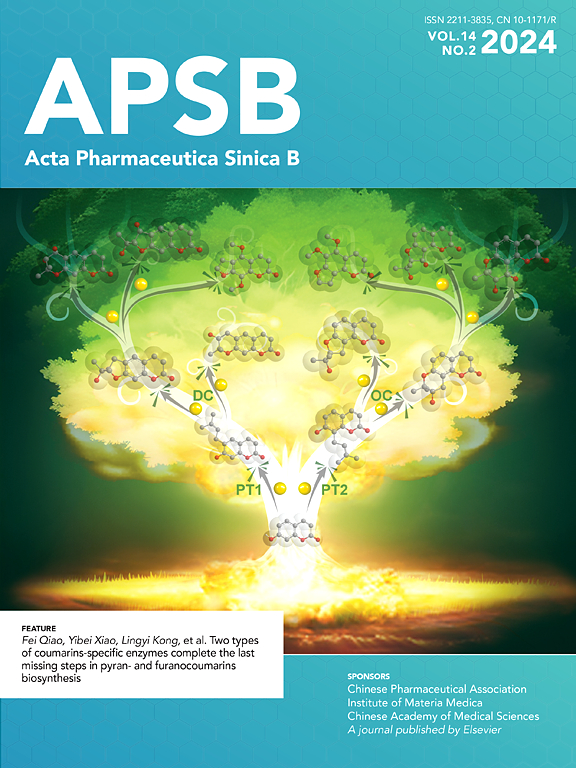Long-chain acylcarnitine deficiency promotes hepatocarcinogenesis
IF 14.7
1区 医学
Q1 PHARMACOLOGY & PHARMACY
引用次数: 0
Abstract
Despite therapy with potent antiviral agents, chronic hepatitis B (CHB) patients remain at high risk of hepatocellular carcinoma (HCC). While metabolites have been rediscovered as active drivers of biological processes including carcinogenesis, the specific metabolites modulating HCC risk in CHB patients are largely unknown. Here, we demonstrate that baseline plasma from CHB patients who later developed HCC during follow-up exhibits growth-promoting properties in a case–control design nested within a large-scale, prospective cohort. Metabolomics analysis reveals a reduction in long-chain acylcarnitines (LCACs) in the baseline plasma of patients with HCC development. LCACs preferentially inhibit the proliferation of HCC cells in vitro at a physiological concentration and prevent the occurrence of HCC in vivo without hepatorenal toxicity. Uptake and metabolism of circulating LCACs increase the intracellular level of acetyl coenzyme A, which upregulates histone H3 Lys14 acetylation at the promoter region of KLF6 gene and thereby activates KLF6/p21 pathway. Indeed, blocking LCAC metabolism attenuates the difference in KLF6/p21 expression induced by baseline plasma of HCC/non-HCC patients. The deficiency of circulating LCACs represents a driver of HCC in CHB patients with viral control. These insights provide a promising direction for developing therapeutic strategies to reduce HCC risk further in the antiviral era.

长链酰基肉碱缺乏促进肝癌的发生
尽管使用了强效抗病毒药物治疗,慢性乙型肝炎(CHB)患者发生肝细胞癌(HCC)的风险仍然很高。虽然代谢物已被重新发现为包括致癌在内的生物过程的积极驱动因素,但在CHB患者中调节HCC风险的特定代谢物在很大程度上是未知的。在此,我们通过大规模前瞻性队列的病例对照设计证明,随访期间发生HCC的CHB患者的基线血浆显示出促进生长的特性。代谢组学分析显示,HCC患者基线血浆中长链酰基肉碱(lcac)减少。lcac在体外以生理浓度优先抑制HCC细胞的增殖,在体内防止HCC的发生,无肝肾毒性。循环lcac的摄取和代谢增加细胞内乙酰辅酶A的水平,从而上调KLF6基因启动子区域组蛋白H3 Lys14乙酰化,从而激活KLF6/p21通路。事实上,阻断LCAC代谢可减弱HCC/非HCC患者基线血浆诱导的KLF6/p21表达差异。循环lcac缺乏是病毒控制的慢性乙型肝炎患者发生HCC的一个驱动因素。这些见解为在抗病毒时代开发治疗策略以进一步降低HCC风险提供了一个有希望的方向。
本文章由计算机程序翻译,如有差异,请以英文原文为准。
求助全文
约1分钟内获得全文
求助全文
来源期刊

Acta Pharmaceutica Sinica. B
Pharmacology, Toxicology and Pharmaceutics-General Pharmacology, Toxicology and Pharmaceutics
CiteScore
22.40
自引率
5.50%
发文量
1051
审稿时长
19 weeks
期刊介绍:
The Journal of the Institute of Materia Medica, Chinese Academy of Medical Sciences, and the Chinese Pharmaceutical Association oversees the peer review process for Acta Pharmaceutica Sinica. B (APSB).
Published monthly in English, APSB is dedicated to disseminating significant original research articles, rapid communications, and high-quality reviews that highlight recent advances across various pharmaceutical sciences domains. These encompass pharmacology, pharmaceutics, medicinal chemistry, natural products, pharmacognosy, pharmaceutical analysis, and pharmacokinetics.
A part of the Acta Pharmaceutica Sinica series, established in 1953 and indexed in prominent databases like Chemical Abstracts, Index Medicus, SciFinder Scholar, Biological Abstracts, International Pharmaceutical Abstracts, Cambridge Scientific Abstracts, and Current Bibliography on Science and Technology, APSB is sponsored by the Institute of Materia Medica, Chinese Academy of Medical Sciences, and the Chinese Pharmaceutical Association. Its production and hosting are facilitated by Elsevier B.V. This collaborative effort ensures APSB's commitment to delivering valuable contributions to the pharmaceutical sciences community.
 求助内容:
求助内容: 应助结果提醒方式:
应助结果提醒方式:


